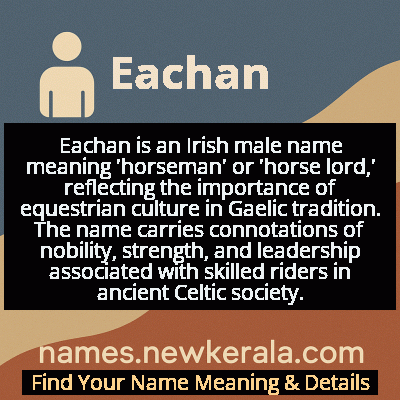Eachan Name Meaning & Details
Origin, Popularity, Numerology Analysis & Name Meaning of Eachan
Discover the origin, meaning, and cultural significance of the name EACHAN. Delve into its historical roots and explore the lasting impact it has had on communities and traditions.
Name
Eachan
Gender
Male
Origin
Irish
Lucky Number
5
Meaning of the Name - Eachan
Eachan is an Irish male name meaning 'horseman' or 'horse lord,' reflecting the importance of equestrian culture in Gaelic tradition. The name carries connotations of nobility, strength, and leadership associated with skilled riders in ancient Celtic society.
Eachan - Complete Numerology Analysis
Your Numerology Number
Based on Pythagorean Numerology System
Ruling Planet
Mercury
Positive Nature
Adventurous, dynamic, curious, and social.
Negative Traits
Restless, impatient, inconsistent, prone to indulgence.
Lucky Colours
Green, white.
Lucky Days
Wednesday.
Lucky Stones
Emerald.
Harmony Numbers
1, 3, 9.
Best Suited Professions
Sales, marketing, travel, entertainment.
What People Like About You
Versatility, charisma, adventurous spirit.
Famous People Named Eachan
Eachan MacRae
Scottish Clan Chief
Led the MacRae clan during the Jacobite uprisings and was known for his military prowess
Eachan MacDonald
Gaelic Poet
Preserved traditional Gaelic poetry and oral histories during cultural suppression
Eachan MacLean
Military Commander
Fought in the Wars of the Three Kingdoms and was renowned for his cavalry tactics
Eachan O'Donnell
Irish Chieftain
Ruled territories in Donegal and maintained traditional Gaelic lordship structures
Name Variations & International Equivalents
Click on blue names to explore their detailed meanings. Gray names with will be available soon.
Cultural & Historical Significance
Throughout the centuries, Eachan remained particularly strong in the Scottish Highlands and western Ireland, where Gaelic traditions persisted longest. During the Jacobite era, many men named Eachan fought to preserve Gaelic culture against English domination, making the name symbolic of cultural resistance and traditional values. The name's endurance through periods of cultural suppression demonstrates its deep cultural resonance among Gaelic-speaking communities. In modern times, Eachan represents a living connection to Celtic heritage and serves as a testament to the survival of Gaelic culture despite historical challenges.
Extended Personality Analysis
Individuals named Eachan are often perceived as possessing strong, dependable characteristics rooted in their name's equestrian heritage. They typically exhibit leadership qualities, confidence, and a natural authority that others find compelling. Like the noble horse their name represents, Eachans are often seen as graceful under pressure, capable of bearing heavy responsibilities while maintaining their composure. There's a traditional strength to their character—they tend to be loyal to their principles and protective of those in their care, much like a trusted steed guarding its rider.
Many Eachans display a blend of traditional values with modern adaptability, able to navigate changing circumstances while staying true to their core identity. They often possess a quiet determination and resilience, facing challenges with the steady persistence of a workhorse combined with the spirited energy of a thoroughbred. Their personality frequently balances strength with sensitivity, making them both respected leaders and trusted companions. The name suggests someone who moves through life with purpose and dignity, embodying the noble qualities associated with their equine namesake while maintaining genuine human connection and emotional depth.
Modern Usage & Popularity
In contemporary times, Eachan remains a relatively uncommon but culturally significant name, primarily used in Ireland, Scotland, and among diaspora communities. While it never reached the popularity of more common Irish names like Sean or Liam, it has experienced a modest revival in recent decades as part of the broader Celtic naming trend. Modern parents who choose Eachan often do so to honor their Gaelic heritage while selecting a distinctive name that stands out from more popular choices. The name is particularly favored in educated, middle-class families who value cultural tradition and linguistic authenticity. In Scotland, it ranks outside the top 500 names but maintains steady usage, especially in the Highlands and Islands. The anglicized form 'Hector' is more commonly used, but Eachan appeals to those seeking a more authentically Gaelic form. Social media and genealogy research have contributed to its renewed interest as people rediscover their Celtic roots.
Symbolic & Spiritual Meanings
The name Eachan carries rich symbolic meanings beyond its literal translation of 'horseman.' The horse in Celtic symbolism represents power, freedom, and nobility—qualities inherently associated with the name. Eachan symbolizes the connection between human and nature, embodying the ideal of harmonious partnership and mutual respect. Like a trusted horse, the name suggests reliability, strength in service, and the ability to carry burdens gracefully. In metaphorical terms, Eachan represents journey and progress, echoing the horse's role in transportation and exploration. The name also carries connotations of heritage and tradition, symbolizing the preservation of cultural identity across generations. In modern interpretation, Eachan can represent someone who bridges traditional values with contemporary life, maintaining cultural roots while moving forward. The symbolic resonance extends to concepts of loyalty, as horses were historically companions in both peace and war, making Eachan emblematic of steadfast friendship and protective instincts.

